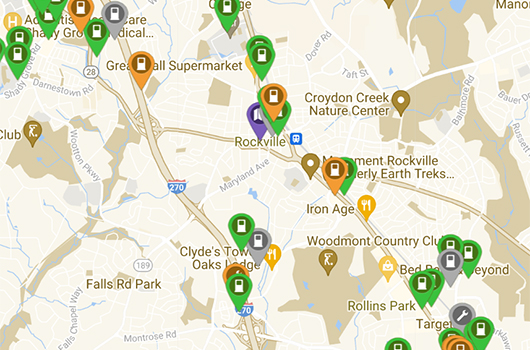About EV Charging
EVs are powered by batteries that must be recharged from an electric source. Compared to gasoline, electricity is more affordable, cost-steady, domestically produced, and can be generated from clean renewable energy. Most people charge their EV at home and charging is also available at workplaces, retail locations, highway rest areas, and parking garages.
Types of EV Chargers
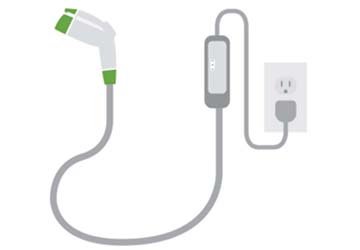
Level 1 Chargers
- Plug into standard 120V outlet found at home (12-30 amps)
- Charging cord and adapter provided by most manufacturers
- 5 miles of range for every 1 hour of charging
- Overnight charging provides 40 miles of range, enough for most drivers
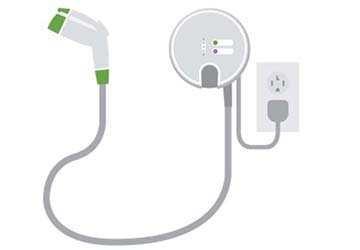
Level 2 Chargers
- Connect to 240V outlets used for dryers and other large appliances (30-50 amps)
- Can be installed at home by licensed electrician
- 25 miles of range for every 1 hour of charging
- Commonly found in public at shopping centers, parks, and parking garages

Level 3 Chargers
- Direct Current Fast Chargers (DCFC) use high-powered 480V circuits (100+ amps)
- 40 miles of range in 10 minutes and fully charge in 30 minutes
- Found along highways and in dedicated public charging stations
- Not compatible with plug-in hybrids and some fully electric models
What does EV charging cost?
![]()
EV charging costs about $40-$80 per month if you drive 40 miles a day. Calculate your fuel and cost savings using Pepco’s EV Savings & Benefits tool.
EV Charging Safety and Best Practices
Safety
According to the Federal Emergency Management Administration (FEMA) and the Insurance Institute for Highway Safety (IIHS), EVs are safe to charge at your home or business when operated correctly with certified charging equipment. FEMA provides EV charging safety tips.
Data compiled from the National Transportation Safety Board (NTSB), the Bureau of Transportation Statistics (BTS), and from Recalls.gov shows that electric vehicles are less likely to catch fire than gas-powered vehicles. EV battery fires have occurred when the battery becomes damaged or punctured, which can result in fires that last longer and require more resources to extinguish than other car fires.
Best Practices
EV batteries can last 10-20 years or up to 300,000 miles if they are maintained well. To maximize the life and performance of your battery:
- Try to usually keep the charge level between 20-80% and moderately charge your vehicle every 2-3 days.
- Avoid depleting the battery entirely and only charge to 100% before taking a long-range trip. You can use automatic features to limit the total charge.
- Avoid daily use of DC fast charging, which places more strain on the battery.
Find EV Charging in Montgomery County
There are over 500 charging plugs open to the public in Montgomery County, including 100 DC Fast Chargers. Sixty-four (64) conveniently located EV charging stations are available at parking facilities in downtown Bethesda, Silver Spring and Wheaton. Maps of those locations are available from the Division of Parking Management. Local utilities have also installed charging at parks and other public facilities.
Check the Department of Energy Alternative Fuels Data Center or charging station location services such as Plugshare to find an EV charger near you.
Install Charging
Montgomery County supports residents and businesses who want to install charging stations on their property. This page includes information to get you started. Visit the Buy an EV page to find federal, state, and utility incentives for EV charging equipment.
Install Charging at Home
Charging at home is one of the biggest benefits of EVs. In fact, over 90% of EV drivers regularly charge their vehicles at home. Download our Home EV Charging Guide for information to get started.
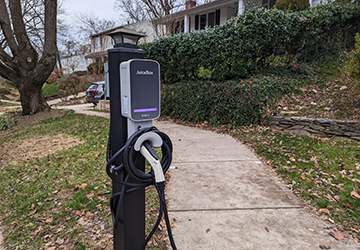 Technical Requirements
Technical Requirements
Charge at home by plugging the manufacturer-provided Level 1 charging cable into a standard 120V outlet or install a Level 2 charger on a 240V circuit. You will need 30-50 amps capacity in your panel box. A licensed electrician can evaluate your current electrical system and advise if you need to upgrade your panel or need additional wiring. Equipment and installation costs $1,500 on average for a Level 2 system, but costs can vary widely depending on the electrical work needed.
PermittingApply for a residential electrical permit from the Department of Permitting Services to install a Level 2 charging station for your garage or driveway.
Curbside Right-of-Way ChargingResidents without off-street parking have the option to apply for a right-of-way permit to install curbside charging equipment in the public right-of-way. The homeowner is responsible for arranging and paying for equipment and installation. Residents may not reserve a parking space on the public street in front of the charging station or take payment for charging, but you may lock the charging equipment or use automatic features to control access. Multiple property owners may coordinate to install one or more shared EV chargers on the street to share costs and use of the charging infrastructure.
Choosing Equipment and InstallerThere are multiple equipment suppliers and installers to choose from. When selecting equipment, check eligibility requirements for utility incentive programs. Equipment vendors may be able to connect you to installer partners. Always work with a licensed electrical contractor. Montgomery County does not recommend individual equipment vendors or installers.
Install Charging at Apartments and Condos
EV charging is a valuable amenity for apartments and common ownership communities, providing residents with cost savings and convenience. Simplify your multifamily EV charging project by following these steps:
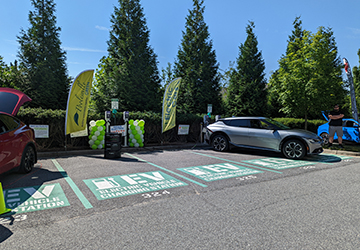
- Survey residents to understand current and future demand for EV charging. Visit VCI-MUD.org for survey templates and other resources.
- Conduct a site review with a licensed electrician to design your project and select your equipment.
- Contact the Montgomery County Green Bank for low-interest financing and technical assistance.
- Contact your electric utility for incentives and power needs.
- Apply for a commercial building permit and electrical permit and follow all regulations and best practices for accessibility.
- Create communicate guidelines and educate residents about best practices to make the most of your shared resource.
The average cost for equipment and installation for commercial EV charging is around $10,000 per charging port. Costs can vary significantly based on the amount of electrical work needed.
Download the Guide to EV Charging at Apartments, Condos, and Townhomes for key decision points, step-by-step process, and resources.
Install Workplace Charging
Drivers park at work for up to 8 hours or more, making workplaces ideal locations for convenient and affordable EV charging. Businesses that make charging available for employees can set their workplace apart from the competition. Both Level 1 and Level 2 charging are useful for employees that leave their vehicle parked for the workday. Charging access can be limited to employees or available to visitors and can be provided for free or can be set up to require payment. Visit the Alternative Fuels Data Center for more information about workplace charging.
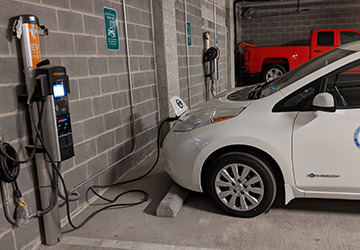
Installing commercial charging requires both a building permit and electrical permit. Contact the Montgomery County Green Bank for low-cost financing and technical resources. If your business is located in one of the County’s Transportation Management Districts, there may be additional resources and requirements for EV charging.
